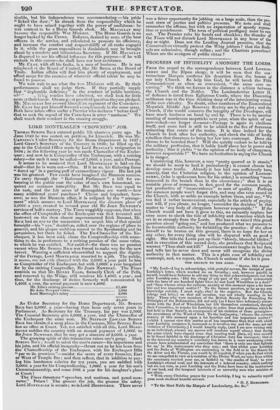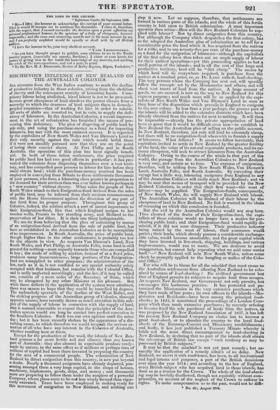PROGRESS OF INFIDELITY AMONGST THE LORDS.
FROM the sequel to the correspondence between Lord LoNnox. DERRY and the Ripon clergy, it will be seen that the con ;
tumacious Marquis confirms his desertion from the bosom of
our holy Church. So help him God, he will break the Fifth Commandment SS often as convenient, " the same case oc-
curring." We think we foresee in the distance a schism between the Church and the Nobles. The Londonderrian Letter II, of' defiance is dated from Eglintoun Castle where the Dissenting nobleman was at the time drinking deep ofthe intoxicating waters of the new chivalry. No doubt, other members of the Emasculated Mopstick Middle Age Recovery Society are in the plot ; and the Church, if she would conserve the integrity of the Decalogue, svill have much business on hand by and by. There is to be another meeting of murderous mopsticks next year, when the spirit of our
new-waked—no longer dormant—Peerage is again to vindicate itself, and more fuel is still to be added to the fire of fierceness animating that estate of the realm. It is time indeed for the Church to look after her authority, and check the tide of lordly rebellion that threatens to bring her law into contempt. Does she choose to be bearded thus ? Will she quietly endure to be told by the military profession' that it holds itself above her in power and authority ; that it yields " to the opinion of no body of clergymen, however respectable ?" We have no hesitation in saying the Church is in danger.
Considering this, however, a very "pretty quarrel as it stands," we should be sorry to heal it prematurely ; it cannot choose but develop some truths. Already it has laid one sufficiently bare; namely, that the Christian religion, in the opinion of LONDON* DERRY, (who is spokesman here for his order,) is something "more honoured in the breach than in the observance ;" that it is an amiable piece of nonsense, in feet, good for the common people,' but productive of' "inconvenience" to men of quality. Perhaps the common people won't forget this, and may also turn round oft the Church, with so noble an exampl before them, and say, "We too feel it rather inconvenient, especially in the article of paying; and will, if you please, no longer, surrender the decision' in that matter to any body of clergymen however respectable.'" Ifthe Church would not have it grow to this, we earnestly implore her once more to check the tide of infidelity and desertion which has set in so strongly from the Lords. She has now raised this grand question about "going out," and has produced what We presume to be incontestible authority for forbidding the practice : if she allow herself to be beaten on this ground, there is no hope for her on any other, for every thing else will be disputed with as good a right. She bids the Lords put up their "bloody, blameful blades;" and in execution of this sacred duty, she produces that Scriptural. warrant "Thou shalt not kill." LONDONDERRRY laughs in her face's and tells her he never does and never will recognize the divine
authority in that matter. This is a plain case of' infidelity an i d contempt, and, we repeat, the Church s undone if she let it pass. '
TIIE CIIURCII TO THE LORD.
" Sigston, 19th August. "My Lord—I beg tu acknowledge, with grateful sorrow, the receipt of your Lordship's letter, which reached me on Saturday ; and, however painful to myself, would have forborne to add any thing to that acknowledgment, but that. your Lordship asks, 'Did the clergy of any part of the empire remonstrate with the hero of one hundred fights when he met Lord Winchilsea in a duel?' and 'from whence arises the extreme anxiety at this moment upon a far hum. bier and less important matter P To the former question, as fur as my own knowledge extends, I must reply, alas I in the negative. But the Church, (clergy and laity,) on that sad occasion, was not wholly wanting in her duty. Those who were members of the British Society for Promoting the Principles of the Reformation, did not only (as I have been informed) remon- strate with the Earl of Winchilsea, but felt themselves constrained, through their Committee, to require his Lordship to retire from that position which Se had held in that Society, in consequence of his violation of those principles— the ascendancy of the Word of God. To the last:inquiry, 'whence the extreme anxiety at this moment upon a far humbler and less important matter?' (whilst I cannot view this matter as of less importance than that with which your Lordship compares it, inasmuch as it involves one and the same act and violation of Christianity,) I would humbly reply, (and I am now writing only as an individual, whence my answer will condemn myself alone,) that during the years which have elapsed since that meeting took place, my own anxiety to be found faithful in the discharge of Christian duty has increased ; that as in the interval my country's extremity has drawn to a more awakening, crisis; events have substantiated my conviction that 'there is only one that hghtetk for us,' be His instruments who they may; and that whilst your Lordship and the Duke of Wellington are contending in the field or in the Senate for. the Altar and the Throne, you would be ill requited, if when you do that which we are compelled to view as a violation of the Divine Word, no voice from within. the sanctuary reached your ear, as faithful to the oracles of God,' to your Lordship's eternal weal, and the interests of a beloved country, which nothing but sin can ruin, as your Lordship and the Duke have been to the institutions, of our land, and the temporal interests of us unworthy men who minister at her altars.
a With every Christian prayer for your Lordship, I beg to subscribe myself your most obedient humble servant. Du
"To the Most Noble the Marquis of Leudouderry, rloomma.
.
THE LORD TO THE CHURCH.
Eglintonn Castle, 2d September 1839.
G Sir—I hfive the honour to acknowledge the receipt of your second letter. Ifeel it would ill become me to continue the discussion. 1 close it, therefore, with the regret, that I cannot surrender the decision upon a point affecting my personal professional honour, to the opinions of a body of clergymen, however respectable; anti the same case occurring, must be met in the same manner by me soul I we perfectly confident would be equally so dealt with by all J3ritisli
soldiem
"1 have the honour to be, your very obedient servant,
"VANE LONDONDERRY.
"As you have thought proper to publish your address to me in the North country papers, (especially my county, Durham,) I claim at your hands the justice of giving also to the world the knowledge of my answers, and sending the whole of the correspondence, and not a part, to print.
To the Rev. H. J. Duncombe, Rector of Kirby Sigston, Ripon, Yorkshire."



























 Previous page
Previous page